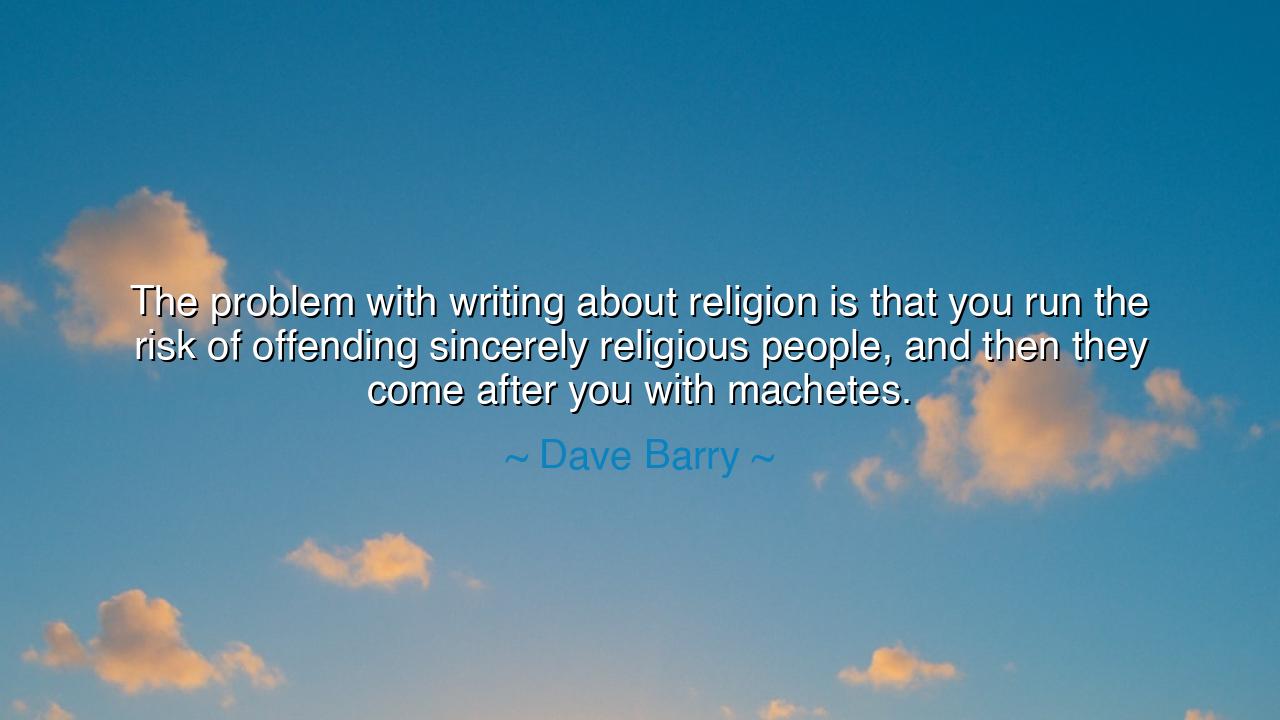
The problem with writing about religion is that you run the risk
The problem with writing about religion is that you run the risk of offending sincerely religious people, and then they come after you with machetes.






"The problem with writing about religion is that you run the risk of offending sincerely religious people, and then they come after you with machetes." – Dave Barry.
In this sharp and evocative statement, Dave Barry highlights a truth that has echoed through the ages—the power of religion to stir deep emotions, both of profound devotion and intense anger. To speak of religion, to question it, or to offer a view that contradicts the deeply held beliefs of others, can invoke a response that is both passionate and dangerous. The use of machetes in Barry’s quote may seem hyperbolic, yet it underscores a very real threat: that religion, when challenged, can transform the soul into a fortress, one that will defend itself with great ferocity.
The ancients understood the power of religion to shape not only the minds but the actions of individuals and societies. Socrates, the philosopher of Athens, was condemned to death for questioning the gods and promoting ideas that undermined the established religious order. His very existence became a threat to the status quo, and it was not his ideas alone that caused his downfall, but the deeply held religious beliefs of the Athenian citizens who saw him as a blasphemer. Socrates' willingness to challenge and question even the divine led to his tragic end. In this sense, Barry’s observation is not just a modern reflection, but one rooted in ancient experiences of conflict between religion and free thought.
The dangers of offending the deeply religious are not limited to ancient times, but persist into our modern world. Salman Rushdie, a man of literature and words, found himself at the center of religious outrage when his book The Satanic Verses was published. The book, which some viewed as blasphemous, led to a fatwa being issued against him by the Iranian government, resulting in years of hiding and fear for his life. Rushdie’s story is a modern echo of what Barry suggests—that to write about religion is to tread upon a volatile terrain, one that can stir passions beyond reason. Words—when they challenge sacred beliefs—become a weapon, provoking anger that is difficult to defuse.
Religious fervor has led to countless acts of violence throughout history. The Crusades, waged by the Christian world against Muslim forces, were driven by a sense of divine mission that justified the killing of thousands in the name of religion. Similarly, the Inquisition, where the Church sought to eradicate heresy, led to the suffering and death of those whose beliefs deviated from orthodox doctrine. Even in the 20th century, the tension between religion and free expression resulted in conflict, as seen in the violence surrounding the publication of controversial works. Barry’s statement, while humorous, points to the real power of religious belief to provoke actions that transcend mere words, leading to very real consequences for those who challenge it.
Yet, there is wisdom to be gleaned from Barry's warning. Freedom of expression and thought are sacred principles, but they come with the responsibility to recognize the depth of belief that exists within others. In the ancient world, philosophers were not merely intellectuals; they were challengers of the established order, and their teachings often came with great personal sacrifice. Socrates, as mentioned, faced death for his beliefs, but he chose truth over fear. Jesus Christ, another figure whose life was grounded in radical ideas, also paid the ultimate price for challenging the religious authorities of his time. These figures teach us that the truth—no matter how it is delivered—can provoke resistance, and sometimes even violence, but it is worth the cost.
However, there is a deeper lesson in Barry’s observation. Respect for the sacredness of others’ beliefs does not require silence in the face of injustice or ignorance, but rather, it calls for a delicate balance between speaking one’s truth and understanding the emotional weight carried by religious convictions. To engage in meaningful dialogue about religion, we must do so with humility, recognizing the power of these beliefs to shape individuals and cultures. It is through respectful discourse—rather than provocation or disrespect—that true understanding can be achieved.
In our own lives, this lesson calls us to be mindful of the impact our words have. While it is important to speak freely and challenge outdated or harmful ideas, we must also approach religious discussions with the awareness that deep convictions are often tied to personal identity and community. We should strive to build bridges of understanding, fostering respectful exchange even when opinions differ. The machetes may not always be literal, but the wounds they represent—those of division and hate—are real. By speaking with compassion and insight, we can begin to heal the rifts that religion often creates and foster a more unified and understanding world.
Thus, as we move forward, let us heed the wisdom in Barry’s words. Let us approach religion, and the passionate beliefs it inspires, with respect and awareness, but also with the courage to challenge the status quo when it stands in the way of truth and justice. In doing so, we honor the delicate balance between freedom of expression and respect for others, ensuring that we create a world where dialogue can thrive without fear of retaliation.






AAdministratorAdministrator
Welcome, honored guests. Please leave a comment, we will respond soon